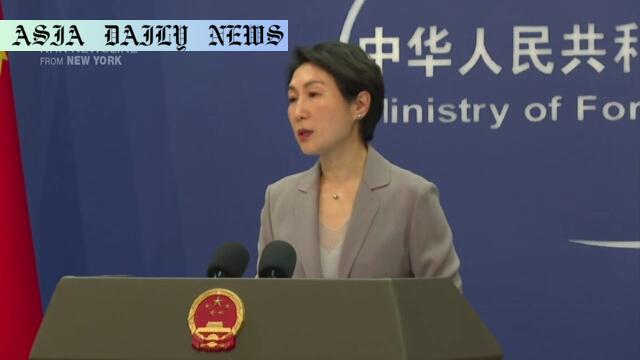China calls for stability and cooperation amid Trump’s new tariff threats.
- China reiterates its stance that trade wars result in no winners.
- Mao Ning emphasizes safeguarding China’s national interests.
- Trump proposes 10% tariffs citing fentanyl as a key issue.
- Disputes arise over Trump’s claims regarding the Panama Canal.

China Reiterates Its Stand Against Trade Wars
China, steadfast in defending its national interests, reaffirmed its long-standing belief that trade or tariff wars yield no winners. Chinese Foreign Ministry spokesperson Mao Ning made these remarks during a news conference, emphasizing the country’s commitment to fostering healthy and stable bilateral relations with the United States. This measured response comes amid escalating tensions following US President Donald Trump’s announcement of potential new tariffs on Chinese imports.
Trump’s Tariff Proposal and Its Justification
President Trump recently unveiled plans for an additional 10% tariff on Chinese goods starting February 1. According to the President, this measure comes as a response to China’s alleged role in the fentanyl crisis. Fentanyl, a synthetic opioid, has caused a significant number of overdose fatalities in the United States, with its transit reportedly traced back to China through Mexico and Canada.
While addressing the media, Trump expressed frustration over the ongoing epidemic, calling for decisive action. However, the finger-pointing approach has intensified the already fragile trade relations between the two economic giants, throwing potential dialogue into uncertainty.
China’s Call for Dialogue and Its Commitment to Sovereignty
Despite the rising tensions, Mao Ning expressed China’s readiness to address bilateral issues through constructive dialogue and to manage differences effectively. The spokesperson underscored the importance of stable, healthy, and sustainable relations, urging the United States to adopt a similar approach.
Mao also addressed Trump’s comments regarding China’s alleged control over the Panama Canal. She clarified that Beijing has neither taken part in managing the canal nor violated Panama’s sovereignty. This statement reinforces China’s commitment to respecting the autonomy and independence of other nations, particularly in sensitive geopolitical regions.
Escalating Trade Tensions: Implications for Both Nations
The growing trade tensions between the United States and China could have far-reaching consequences for both economies and the global market. History has shown that tariff wars typically trigger ripple effects, affecting businesses, consumers, and international supply chains. As the world’s two largest economies face off, stakeholders across the globe remain watchful of the developments.
However, China’s diplomatic rhetoric and calls for constructive dialogue suggest that there remains a window of opportunity for de-escalation. The critical question is whether the United States will reciprocate this approach or continue to rely on aggressive measures that could exacerbate the crisis.
Global Reactions and the Path Forward
The international community is closely monitoring the situation, as the dynamics between the US and China profoundly affect global trade and economic stability. Countries with vested interests in maintaining open trade channels may play a mediating role in calming tensions. Multilateral cooperation could emerge as a potential solution to current and future disputes.
Looking ahead, fostering mutual trust and minimizing misunderstandings will be essential for both sides to navigate these challenges effectively. At its core, dialogue and diplomacy stand as the only sustainable solutions to averting economic confrontation and ensuring global prosperity.



Commentary
The Need for Constructive Dialogue
The escalating trade tensions between the United States and China highlight the fragility of international economic relations in an era of increasing geopolitical uncertainty. While both sides have justifiable concerns, resorting to unilateral actions like tariffs often generates more harm than resolution. China’s consistent rhetoric about the futility of trade wars should serve as a wake-up call to the global community about the importance of dialogue and multilateralism.
Trump’s Approach and Its Implications
President Trump’s decision to intertwine trade policy with sociopolitical issues such as the fentanyl crisis underscores his administration’s controversial approach to diplomacy. By linking these vastly different concerns, the United States risks alienating not only China but also other nations observing the situation. Such strategies may solve short-term issues but will likely lead to long-term instability in global economic systems.
Seeking Common Ground for Global Stability
It is essential for both nations to recognize the mutual benefits of cooperation. China’s willingness to engage in dialogue offers a pathway to de-escalation, but this requires reciprocation from the United States. Both sides should prioritize long-term stability over immediate political gains to prevent further economic and social fallout.
Ultimately, fostering trust and mutual respect remains the cornerstone for resolving disputes. The world is watching as two economic powerhouses navigate these complex issues. Their choices will set a precedent for how future trade conflicts are managed in an increasingly interconnected world.